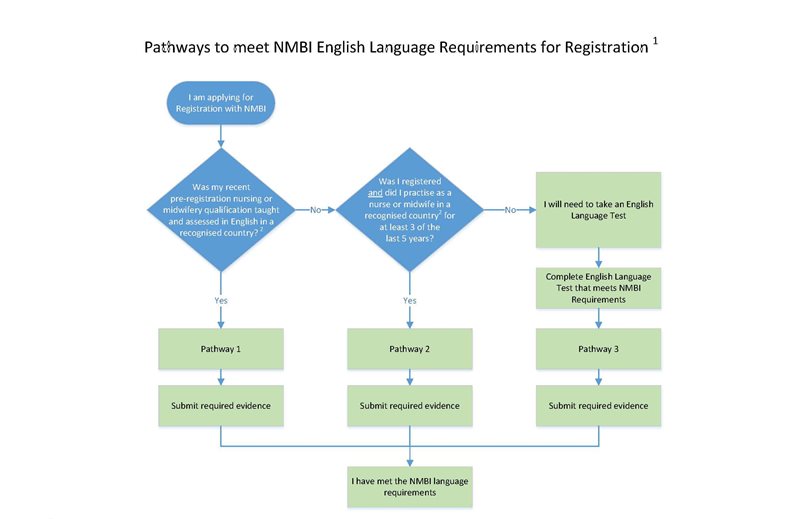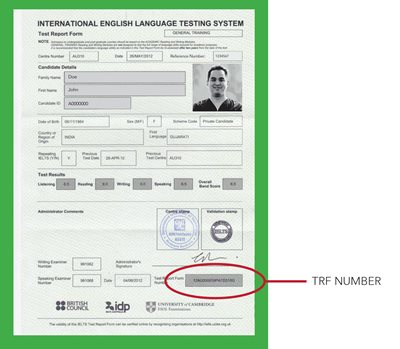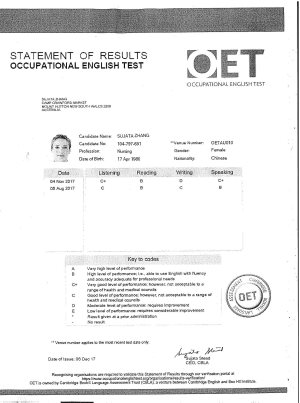English language competence and overseas applicants
From 2 April 2018, applicants for registration with the Nursing and Midwifery Board of Ireland who have qualifications from outside of Ireland must now satisfy the Board that they have the necessary knowledge of English to communicate effectively in their practice.
Communication is defined as speaking, reading, listening and writing, and the applicant must provide evidence that demonstrates competence in these four mandatory skills.
To facilitate this, it is proposed to offer all applicants from outside of Ireland a number of methods by which they can demonstrate that they meet the NMBI English Language requirements.
Clarification of NMBI’s English language requirement handling
NMBI has recently changed the application process for non-directive registration of overseas applicants.
1) Paper-based (old) process
Previously the application process consisted of a single process. Applicants were required to provide evidence of English language proficiency at the first stage of their application, when requesting an application pack.
2) Digital (new process)
With the launch of our new online registration system (MyNMBI), this process has now been separated and replaced to consist of TWO applications processes. These are:
- Stage 1. Qualification recognition application
- Stage 2. Registration application
Please note: All applicants must make an application (Stage 1) to have their qualifications recognised prior to making an application for registration.
Once NMBI is satisfied that the applicants’ qualification meets the relevant standards, the applicant is then required to apply for registration through a separate application process.
It is at the point of making an application for registration (Stage 2) that applicants are required to provide evidence of English language proficiency.
Therefore, under the new system, applicants are permitted to apply to have their qualifications recognised without having to provide evidence of language competency. However, should the applicant wish to progress to apply for registration, NMBI will require evidence of English language competency in order to process this application.
How do we handle paper-based and digital applications?
We are currently still processing applications that commenced via the old paper-based route. If an applicant started a paper-based application (Stage 1 above), NMBI still requires that the English language test is valid at the time of that application (i.e. completed within two years of the application submission date). In other words, the old paper-based route still requires a valid test at the qualification recognition stage.
However, if an applicant submitted their application online (i.e. started the process after 28 September 2020) then they will be requested to provide evidence of English language proficiency at the point of registration (Stage 2). For those submitting English language tests, the test results need to be valid at the point of submission of the registration application (i.e. not at the point of qualification recognition application).
Pathways
Please click on the pathways diagram below to enlarge it:

Pathway 1: Trained in English in a NMBI Recognised Country
The pre-registration nursing or midwifery qualification which an applicant is relying on for registration was taught and examined in English in one of the NMBI recognised countries. NMBI will recognise the following countries as majority English speaking for the purpose of registering and practising in Ireland:
- Australia
- Canada
- New Zealand
- The United States of America
- United Kingdom
Evidence required:
- Document showing evidence of qualification completion and location of college
- If the college is based in one of the French provinces of Canada (Quebec or New Brunswick), the college must provide confirmation that the qualification and practice placements were completed in English.
Exemptions:
- NMBI will also accept if an applicant completed their pre-registration qualification in an EU country where English is listed as a co-official language. The applicant must hold automatic qualification recognition under the EU Directive. The college must provide confirmation that the qualification and practice placements were completed in English.
- NMBI will consider any evidence of English language competency, equivalence to CEFR (C1) from EU Directive applicants only.
- NMBI will consider secondary or third level qualifications in, or through, English if evidenced as equivalent to CEFR C1 from EU Directive applicants only.
Pathway 2: Registered and practised in English
An applicant who wishes to rely on evidence that that they have registered and practised in English must be able to prove that they have 3 years post registration practice within the last five years in one of the NMBI recognised countries.
- Australia
- Canada
- New Zealand
- The United States of America
- United Kingdom
Evidence required:
A letter on headed paper or an email from the applicant’s employer/s or nursing authority covering the following:
- Location of employment
- The dates of employment
- Applicant’s job title (nursing or midwifery)
- If the employer is based in one of the French provinces of Canada (Quebec or New Brunswick), the employer must provide a statement confirming that the applicant was practising as a nurse or midwife primarily in English.
Pathway 3: English Language Tests
The applicant may submit a certificate of test results from either the International English Language Test System (IELTS) or Occupational English Test (OET).
Evidence required:
NMBI accepts International English Language Testing System (IELTS) Academic Test, IELTS Academic Test for UKVI, and the Occupational English Language Test (OET) as evidence of English language competency.
NMBI will also consider other test results that are comparable and equivalent to CEFR (C1) from EU Directive applicants only.
Please refer to the tables below for the minimum levels in each of the tests that are accepted by NMBI:
| IELTS Academic Test |
Minimum International English Language Testing System (IELTS) Academic Score |
| Listening |
7.0 |
Overall IELTS score of 7.0 with a minimum of 7.0 in any three components and 6.5 in any one component.
(please see table for example) |
| Reading |
7.0 |
| Writing |
6.5 |
| Speaking |
7.0 |
| Overall |
7.0 |
| OET |
Minimum Occupational English Test (OET)
Grade and Scores |
| Listening |
B (350 - 450) |
OET (Nursing) with Grade B in three components and C+ in one component.
(please see table for example) |
| Reading |
B (350 - 450) |
| Writing |
C+ (300 - 340) |
| Speaking |
B (350 - 450) |
Please note that:
- We only accept IELTS/OET test results that are less than two years old. If your test results are out of date, you will need to re-sit the IELTS/OET
- NMBI will independently verify your scores
- We only accept one test result and do not accept combined results
- We do not accept IELTS One Skill Retake
- We do not accept IELTS online or OET at home.
Important
- Do not apply for registration until you meet the minimum scores under the IELTS Academic Test/OET
- Ensure that the test result is current
- Remember that if you make an application and don’t meet the English language competence requirements, the assessment fee is non-refundable
TRF Number/ OET Candidate Number
You must provide your Test Report Form (TRF) Number/OET Candidate Number when completing the Overseas Registration Application Pack. Your TRF Number is the 15–18 characters (alpha/numeric combination) which you will find on the bottom right hand corner of your Test Report Form. Your OET Candidate Number is the 9 digit number noted under your name on your OET Statement of Results sheet. NMBI will use the TRF/OET number you provide to independently verify your scores.

